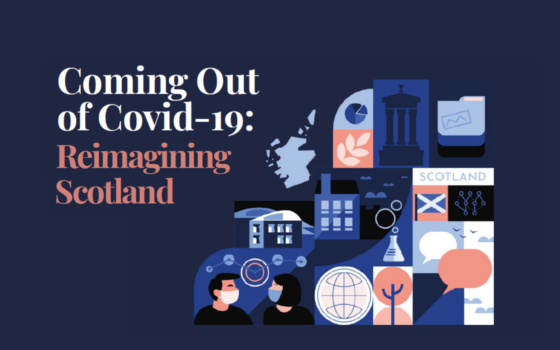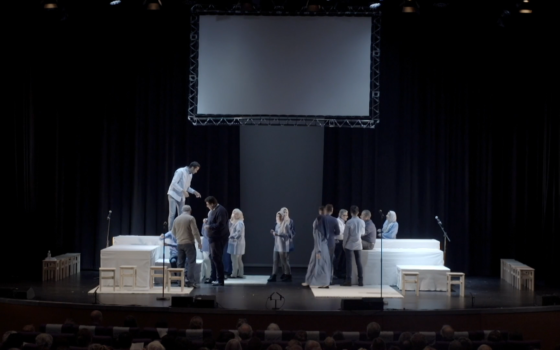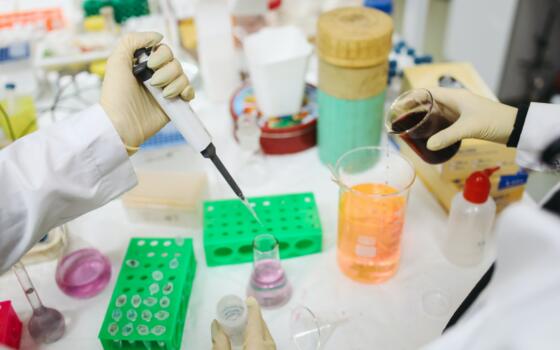Coming out of Covid-19: Reimagining Scotland
The Post-Covid-19 Futures Commission was established to identify and address some of the immediate policy implications and challenges arising from the coronavirus outbreak and support the future of Scotland beyond the immediate crisis. The Commission has spent the past 18 months exploring four key themes: how to build national resilience; what makes good public debate and participation; the use of data, evidence and science in understanding and responding to Covid-19; and how inclusive public service was witnessed throughout the pandemic.
The learnings and recommendations of the Commission have now been brought together into a report. Download the report here.
The individual Working Groups also produced summary reports of key learnings from individual work streams. You can find these below.
Working Group Summaries:
Building National Resilience
What does a resilient Scotland look like and how do we prepare for this?
- There is a need to increase understanding of resilience at all scales and across all sectors of society.
- Resilience is often seen as somebody’s else’s problem. Everybody and every organisation has a role to play in building systemic resilience.
- Resilience needs to be built into the physical and administrative structures of society.
- The potential trade-off between efficiency and resilience needs to be addressed.
- Understanding risk is the first step to creating resilience.
- There is a need to develop an inclusive and collaborative approach to decision-making on resilience.
- Inequality weakens resilience.
- The relationship between humans and nature is crucial to resilience.
Hear from Professor Sir Ian Boyd FRSE, Commissioner and Chair for the Building National Resilience Working Group, in this short video about the group’s key findings.
Download the Working Group summary document here.
Inclusive Public Service
What can we learn in terms of practices, approaches and outcomes of those delivering person-centred public service across Scotland? What change is possible in the near future?
- Urgent change is needed to Scotland’s public service to putpeople at the centre, giving everyone the help and support they need to live a full life.
- The Covid-19 crisis highlighted Scotland’s deep and longstanding inequalities.
- We are a rich country, but we spend too much public money on propping up old systems designed for a different time.
- We need to ask: ‘What matters to you?’ instead of: ‘What’s the matter with you?’
- Our community films show some of the ways that people across Scotland have been supporting each other with generosity, energy and imagination. We can learn from these examples.
- We have to start locally, come up with ideas and try them out.
- The Commission is calling for the Scottish Government to lead the change.
Hear from Caroline Gardner FRSE, Commissioner and Chair for the Inclusive Public Service Working Group, in this short video about the group’s key findings.
Download the Working Group summary document here.
Public Debate and Participation
How have the public been informed and engaged in Scotland’s Covid-19 experience? How do we build on this experience to improve the quality of public debate and increase the impact of public participation in decision making?
- Participation needs to be hard-wired into policy and decision making from inception to implementation.
- We need to better enable everyone to engage and participate effectively.
- The way in which public health messages are communicated is key to effective understanding and engagement.
- How we talk about people matters.
Hear from Talat Yaqoob FRSE, Commissioner and Co-Chair for the Public Debate and Participation Working Group, in this short video about the group’s key findings.
Download the Working Group summary document here.
Data, Evidence and Science
What does Covid-19 teach us about how data, evidence and science is accessed, used and communicated? How can we use this learning to enhance Scotland’s ability to effectively use data, evidence and science?
- Transparency is critical for public understanding and building trust.
- Engagement with the public supports understanding and underpins effective decision-making.
- A holistic collaborative approach is fundamental to responding effectively to complex challenges.
- Good communications is key to ensuring public understanding.
Hear from Professor Niamh Nic Daéid FRSE, Commissioner and Chair for the Data, Evidence and Science Working Group, in this short video about the group’s key findings.







